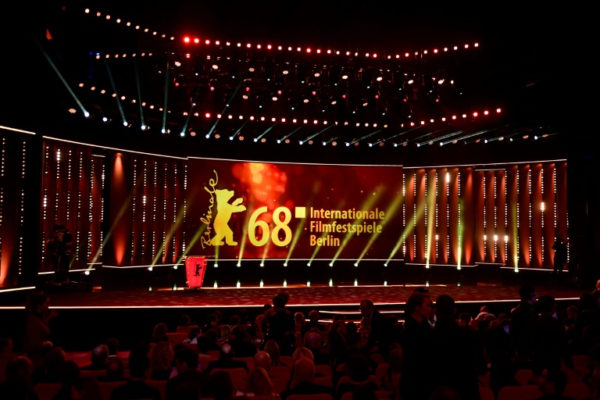
The 68th Berlinale is taking place as the global film industry struggles to get to grips with a wave of sexual abuse allegations against key players. Image: AFP/Tobias Schwartz
Stars and activists seized on the opening of the Berlin film festival Thursday to spotlight the #MeToo movement, expressing hope that rampant sexual abuse in the global entertainment industry can be stopped.
The 11-day event, Europe’s first major cinema showcase of the year, kicked off with the warmly-received world premiere of acclaimed US director Wes Anderson’s new animated feature “Isle of Dogs”.
Actors Bryan Cranston, Jeff Goldblum and Bill Murray, who voice the pack of pooches in the movie, told AFP that the time had come to revolutionize the approach to sex and power.
“I look at it as a great thing that the pillars of misogyny are falling,” Cranston said, expressing shock at the “abhorrent behaviour” that had come to light since more than 100 women accused producer Harvey Weinstein of sexual harassment, assault and rape.
Goldblum, 65, said he was optimistic that “pages are being turned and chapters are being newly conceived” where “equal treatment and empowerment of women” are “the order of the day without exception.”
Murray said the outpouring of anger had given him more empathy for the opposite sex.
“To be a woman is to be sized up at all times, often — it’s animal. And I don’t know if I would enjoy it,” he said.
“As if nothing happened”
With the industry in turmoil over waves of allegations against powerful industry players, the Berlinale is seeking a delicate balance between Hollywood glamour and frank debate in the wake of Weinstein’s downfall.
But even before the festival opened, controversy erupted over the inclusion of award-winning South Korean director Kim Ki-duk, who was fined in December for assaulting an actress on set.
The actress, who has refused to be publicly identified, has accused the festival— traditionally a strong champion of Asian cinema— of “hypocrisy” for inviting Kim to present his latest picture, “Human, Space, Time and Human”.
Festival director Dieter Kosslick said he had excluded a handful of films because of credible sexual abuse allegations against their directors, screenwriters or stars.
But he told AFP he did not bar Kim because sexual harassment allegations by the same actress against him had been dismissed for lack of evidence, adding that he was seeking more information about an appeal in the case.
“Obviously the Berlinale condemns and opposes any form of violence or sexual misconduct,” Kosslick said.
On Thursday, a coalition of more than 100 South Korean civic groups kept up the pressure, releasing a statement condemning the festival’s stance.
“We are living in this unfair reality in which a physical assault offender is working and being welcomed everywhere as if nothing happened, while the victim who spoke out against the abuse is being isolated and marginalised,” the alliance of about 140 groups said in a joint statement sent to AFP.
Meanwhile an online petition calling for the Berlinale to lay a black carpet instead of a red one as a sign of support for sexual assault and harassment victims drew 21,000 signatures.
The festival rejected the call, but some guests wore black to the “Isle of Dogs” premiere, following a similar solidarity gesture at last month’s Golden Globe awards.
And German actress Anna Brueggemann launched the Twitter hashtag #NobodysDoll to encourage female stars to abandon the high heels and low-cut gowns common at gala screenings for more “comfortable” clothing.
First animated opening film
It was Anderson’s fourth turn in competition for the Berlinale’s Golden and Silver Bear top prizes following “The Grand Budapest Hotel”, “The Royal Tenenbaums” and “The Life Aquatic with Steve Zissou”.
Tom Tykwer, one of the German directors behind the blockbuster mini-series “Babylon Berlin” now appearing on Netflix, is leading a gender-balanced jury that will hand out the awards on February 24.
The competition features 19 films, four of them by female directors.
“Isle of Dogs”, which drew enthusiastic applause, was made in the stop-motion style of Anderson’s hit “Fantastic Mr Fox” from 2009.
It was the first animated film to open the Berlinale, now in its 68th year.
Last year, a tender Hungarian love story set in a slaughterhouse, “On Body and Soul” by female director Ildiko Enyedi, captured the Golden Bear. It is now nominated for an Academy Award for best foreign language film. CC
RELATED STORIES:
#MeToo not just a movement, but also evidence in discrimination claims